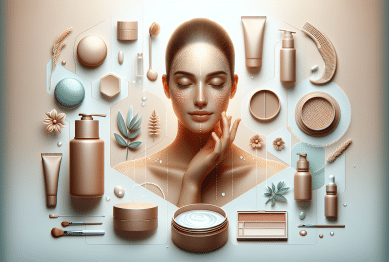Curious about radiant skin? Explore how collagen supplements, topical serums, and nutrition habits can influence your natural glow. This detailed wellness guide debunks myths and explains factors that impact the look, strength, and elasticity of your skin.
The Role of Collagen in Skin Health
Collagen plays a vital role in maintaining the appearance and elasticity of the skin. As a naturally occurring protein, it forms the structure that supports firmness and resilience, helping maintain a smooth look as time passes. Over time, factors like sun exposure and natural aging can decrease the body’s collagen production. This loss can lead to visible signs such as fine lines, dryness, or a dull complexion, sparking interest in ways to support or replenish collagen stores for a healthy glow.
Understanding collagen’s structure helps make sense of its cosmetic benefits. Formed by three polypeptide chains, it provides a mesh that keeps skin bouncy and robust. Research indicates that incorporating supportive nutrients—such as vitamin C and balanced amino acids—can contribute to ongoing synthesis. This natural process is essential for protecting against sagging or loss of radiance, motivating many to seek strategies that encourage a vibrant appearance.
While topical products promise targeted outcomes, the most sustainable approaches often blend internal and external care. Collagen’s molecular size typically prevents it from penetrating deeply through the skin’s barrier when applied in creams. Therefore, focusing on proper hydration, balanced diets, and healthy lifestyle choices remains foundational for supporting lasting results. Small daily steps may provide noticeable changes in the skin’s texture over time.
Can Collagen Supplements Make a Difference?
Collagen supplements are widely discussed in wellness communities. Hydrolyzed collagen peptides—often available in powder or capsule form—are designed to be easily absorbed and provide building blocks for the body. Research suggests that supplementing with these peptides may contribute to skin elasticity and moisture retention, especially with consistent use. However, individual results may differ and depend on factors like age, overall diet, and sun exposure (Source: https://www.ncbi.nlm.nih.gov/pmc/articles/PMC6835901/).
Consumers often wonder how long it takes to see benefits. Studies have shown that positive effects on skin hydration and wrinkle depth could become noticeable after several weeks of daily intake. It is important to select reputable brands, as not all supplements are created equally, and ingredient quality can influence outcomes. For those interested in maximizing skin support, incorporating adequate protein and hydration alongside supplementation is often recommended for amplified effects.
Despite promising clinical trials, collagen supplementation is not a magic solution. Skin health depends on various lifestyle choices. Using supplements as part of a balanced approach—including sun protection, a nutrient-rich diet, and quality sleep—tends to yield more visible and lasting results. Observing changes over time and setting realistic expectations help individuals appreciate small improvements as part of a comprehensive self-care plan.
Topical Collagen: Separating Fact from Fiction
Many skincare products claim to deliver collagen directly to the skin. These creams and serums are frequently marketed for their firming or plumping effects. However, scientific analysis reveals that the collagen molecule is typically too large to penetrate deeply into the epidermis. The visible effects consumers notice from such creams are often due to moisture-binding agents, which temporarily enhance softness or tightness on the surface layer of the skin.
Some formulations incorporate hydrolyzed collagen, which has been broken down into small peptides. While theoretically easier to absorb, research is ongoing regarding how much reaches deeper layers to stimulate meaningful change. Moisturizers with collagen may still hold value for increasing immediate hydration and comfort, but for more enduring improvements, dermatologists recommend protecting existing collagen with daily sun protection and antioxidant-rich skincare (Source: https://www.aad.org/public/everyday-care/skin-care-basics/anti-aging/boosting-collagen).
Realistic expectations make a difference when exploring topical products. While the sensation of smoother or plumper skin after application is pleasant, scientific consensus suggests focusing primarily on preventative strategies. Targeting factors that degrade collagen—such as UV rays, pollution, and poor nutrition—is critical for maintaining a youthful complexion, providing a more effective approach than topical collagen alone.
Nutrition’s Impact on Collagen Production and Skin Appearance
Nutrition plays a significant role in the body’s ability to generate and maintain collagen. Key nutrients—such as vitamin C, zinc, copper, and proline—act as co-factors in the collagen synthesis pathway. A colorful diet filled with citrus fruits, berries, leafy greens, nuts, and proteins supplies what the skin needs to stay resilient. These dietary choices not only impact the rate of collagen production but also support the structure and integrity of the skin’s barrier.
Conversely, lifestyle habits like excessive sugar and refined carbohydrate consumption can hinder collagen renewal. Advanced glycation end-products (AGEs), formed when sugars bond with proteins, may make skin more brittle and susceptible to wrinkles. Choosing whole foods and minimizing highly processed snacks can help counteract this effect. Hydration also supports collagen by keeping the extracellular matrix flexible and supple.
Integrating collagen-boosting meals doesn’t have to be complicated. Soups made with bone broth, lean meats, and plant-based options like legumes and seeds contribute beneficial amino acids. Combining these foods with vitamin C-rich produce can amplify synthesis. Setting simple goals for more balanced meals makes a gradual difference in how skin looks and feels, reinforcing wellness from the inside out.
Lifestyle Choices That Affect Skin Radiance
Beyond supplements and skincare routines, lifestyle decisions shape how collagen supports glowing skin. Smoking and excessive alcohol intake have been linked with accelerated breakdown of skin structure, leading to dryness and deepening wrinkles. Daily sun exposure without protective measures further erodes collagen fibers, causing uneven tone and reduced firmness. Small changes, like using sunscreen and staying smoke-free, act as powerful long-term investments in skin wellness.
Exercise is another beneficial habit for supporting youthful-looking skin. Physical activity boosts circulation, delivering oxygen and nutrients that foster collagen renewal. Stretching and resistance routines help maintain muscle tone and skin elasticity. Coupled with relaxation practices—such as mindfulness or gentle yoga—these habits reduce stress hormones that can hinder the body’s repair cycles (Source: https://www.hsph.harvard.edu/news/hsph-in-the-news/exercise-skin-aging/).
Quality sleep is sometimes overlooked, yet it is crucial for skin restoration. During deep sleep, the body ramps up growth hormone production and repairs tissue, including collagen fibers. Prioritizing rest, creating a soothing nighttime routine, and maintaining a regular sleep schedule help restore radiance and minimize visible signs of strain. Over time, these simple habits contribute to a smoother, brighter complexion.
Understanding the Hype and Hidden Truths
With new products and trends emerging constantly in beauty, separating fact from marketing can be challenging. Collagen maintains popularity in wellness circles, but nuanced understanding is necessary. Not every claim holds up to scientific scrutiny—especially when it comes to overnight transformations. Most credible evidence emphasizes gradual improvement and the importance of combining various strategies (Source: https://www.healthline.com/nutrition/collagen-benefits).
It helps to approach collagen-related trends with healthy curiosity. Consider what fits your personal values and lifestyle, and look for products or foods with transparent sourcing and tested quality. Relying on peer-reviewed studies and established recommendations can guide decisions. As always, consulting with healthcare professionals or dermatologists before making significant changes ensures that expectations match what is both safe and achievable.
Emphasis on skin health as part of holistic well-being extends beyond a single ingredient or trend. Consistency, moderation, and informed choices are often the secret behind the natural glow many seek. By adopting practices that nurture the whole body—nutrition, rest, movement, and mindful care—lasting beauty becomes a natural result over time, rather than a fleeting promise.
References
1. Choi, F.D., Sung, C.T., & Juhász, M.L.W. (2019). Oral Collagen Supplementation: A Systematic Review of Dermatological Applications. Journal of Drugs in Dermatology, 18(1), 9-16. Retrieved from https://www.ncbi.nlm.nih.gov/pmc/articles/PMC6835901/
2. American Academy of Dermatology Association. (n.d.). How to Boost Collagen. Retrieved from https://www.aad.org/public/everyday-care/skin-care-basics/anti-aging/boosting-collagen
3. Harvard T.H. Chan School of Public Health. (n.d.). Why Exercise May Help Reduce Skin Aging. Retrieved from https://www.hsph.harvard.edu/news/hsph-in-the-news/exercise-skin-aging/
4. Healthline. (n.d.). 6 Benefits of Collagen Supplements. Retrieved from https://www.healthline.com/nutrition/collagen-benefits
5. Cleveland Clinic. (2022). Collagen: What Is It, Types, and Function. Retrieved from https://my.clevelandclinic.org/health/articles/23089-collagen
6. Mayo Clinic. (2022). Do Collagen Supplements Work? Retrieved from https://www.mayoclinic.org/healthy-lifestyle/nutrition-and-healthy-eating/expert-answers/collagen-supplements/faq-20568341










 Small Changes You Make To Create a Healthier Home Life
Small Changes You Make To Create a Healthier Home Life 

